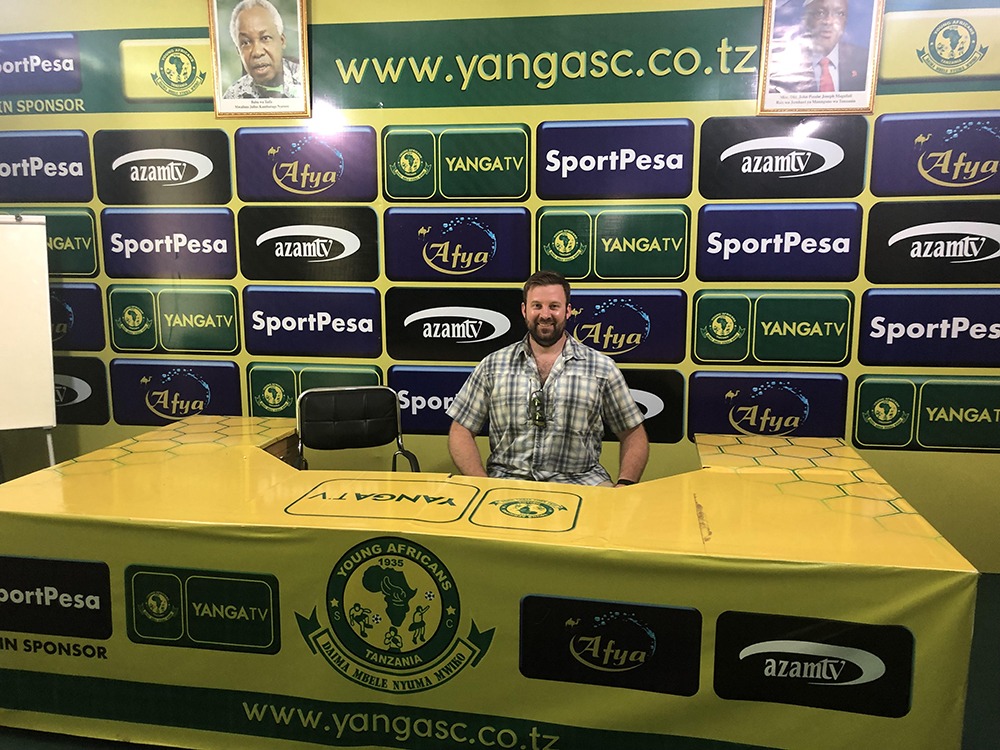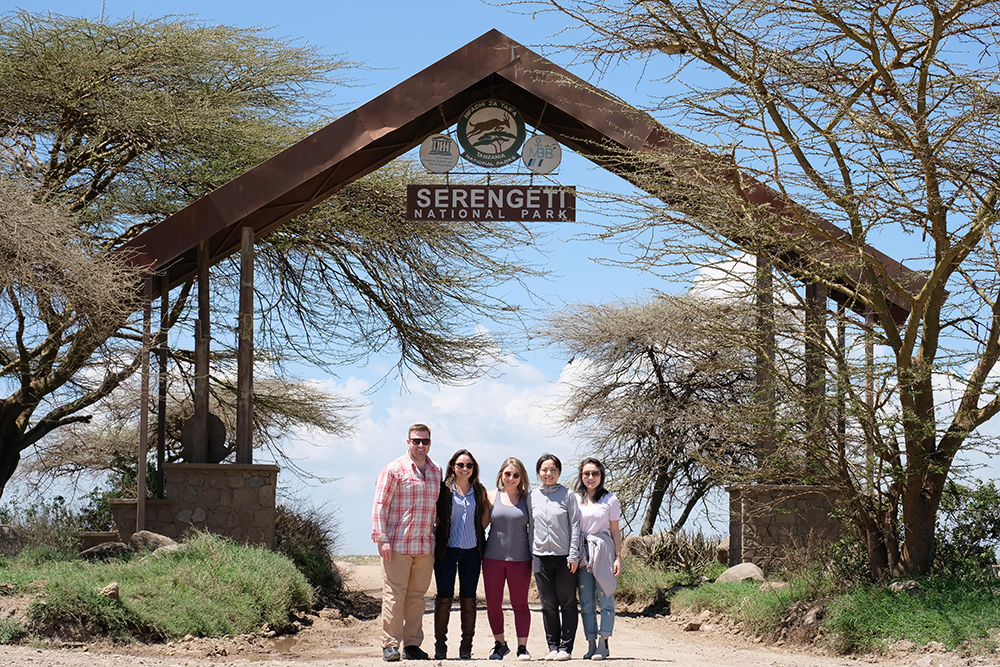Northwestern Law students gain international legal perspective through student-driven class, research, and trip to Tanzania
Northwestern Law students gain international legal perspective through student-driven class, research, and trip to Tanzania

Michael Bassi sits in the press room at the Young Africans Football Club, which Bassi refers to as "the Tanzanian equivalent of the New England Patriots or New York Yankees." The team is closely linked to the Tanzanian independence movement and the Chama Cha Mapinduzi (CCM) political party, which has long held control of the country.

A few students pose at the gates to the Serengeti.
When Northwestern Pritzker School of Law student Fan Cheng and her classmates traveled to Tanzania over winter break, they planned to interview activists, government officials, and media leaders about free speech issues in Tanzania.
In Tanzania, journalists have been abducted, and media licensing fees are prohibitive to maintaining a strong journalistic presence. But the real story is the legal and community response to media restrictions, said Cheng.
“Our interviewees emphasized resilience,” said Cheng in a presentation about her group’s research project in January. “Tanzanians are trying to figure out a way to pass through the current period of restrictions and find ways to do better.”
As part of an academic research project through Northwestern Law’s International Team Project (ITP) class in fall semester last year, Cheng and her classmates delved into Tanzania’s history, politics, economics, and culture to formulate law research topics. The class split into four groups based on research interest, and explored these issues – corruption, energy, educational reform, and free speech – during a two week trip to the country in December and January.
“The ITP class is one of the draws of coming to Northwestern Law,” said Michael Bassi, a third-year law student in the ITP: Tanzania class this fall. “The international focus in the curriculum is a huge component of education at Northwestern.”
Student-driven class builds legal research teams
International Team Project (ITP), one of the Law School’s most popular comparative law courses, began 20 years ago, in 1999, and remains a draw for prospective law students interested in an international legal perspective.
“If you don’t understand the foreign legal system, you’re less prepared as an attorney,” said Bassi. “There is a growing demand for work in Africa, where there is a relative lack of legal research, coupled with a growing economic presence. It gives you a competitive edge to have a specialization in that area.”
This fall, as is par for the course, students led the class themselves. In every ITP class, faculty advisors determine the class proposal and legal topics within the country of interest, but the course content itself remains student-driven.
Students elect student leaders, draft the syllabus, find guest speakers, organize the reading material, decide on research projects, and even secure interviews during time spent abroad to support their work.
Northwestern resources in African Studies provide historical, cultural, and legal insight to student researchers
In the Tanzania class last fall, students took advantage of Northwestern’s wealth of resources on the region. Utilizing the University’s Melville J. Herskovits Library of African Studies—the largest separate Africana collection in existence—was crucial to the class’s development, said Bassi.
Florence Mugambi, Northwestern’s African Studies Librarian, came in as a guest speaker to educate students on East African history and context and was also able to provide popular culture references to further students’ research. Mugambi introduced students to JamiiForums, the most popular social network site in East Africa, which led the students to interview its founder, Maxence Melo.
Ronald Allen, a Northwestern Pritzker Law professor and international expert in evidence law, lectured on his work in helping the Tanzanian government reform their whole law code on submitting and accepting evidence in courts. Allen also provided a wealth of high-level contacts in the country, including Ibrahim Hamis Juma, the current Chief Justice of the highest court in Tanzania, for student interviews.
A mix of academics, legal experts, and speakers from all walks provided the students with valuable context on how to conduct themselves as researchers in Tanzania.
“There’s a concept in Tanzania that roughly translates to ‘speedy,’” said Bassi. “Westerners are too speedy, and don’t have the ‘hakuna matata’ mentality. We learned to check our own impulses and instincts in our interviews to be more respectful of their culture.”
An international legal perspective
Bassi, whose group explored foreign investment and energy issues in Tanzania, said he came away from key interviews with a newfound appreciation for the ways that law functions in different historical, political and legal contexts.
“Coming from a Western perspective, it’s easy to be very judgmental, but if you check your bias and understand the historical implications and historical context, it’s easier to sympathize and understand legal decisions in Tanzania,” said Bassi.
Christopher Martin, a Northwestern Pritzker Law professor who advised the ITP: Tanzania class, said that he can see, through class presentations and final projects, the impact of the trip on students’ legal understanding and worldview.
“There’s something about immersing yourself into a subject when you visit the country,” said Martin. “You’re so used to sitting in front of a computer and looking up precedents and case filings in legal research, but when you sit across the table from an expert in the field and talk about a topic, it brings the law to life. You see the face of the law and consequences of law in a different country, a different culture.”
For Bassi, this kind of understanding was honed through actually visiting the country and learning about Tanzania firsthand.
“It’s not just the black and white letter of the law. Law operates in a body with culture, history, business, and markets. It is one entity of many that operates in the same ecosystem,” said Bassi. “If I interpret just the black and white law, it will be a disservice to myself and my client. You have to understand why the law is the way that it is in the context it exists in.”